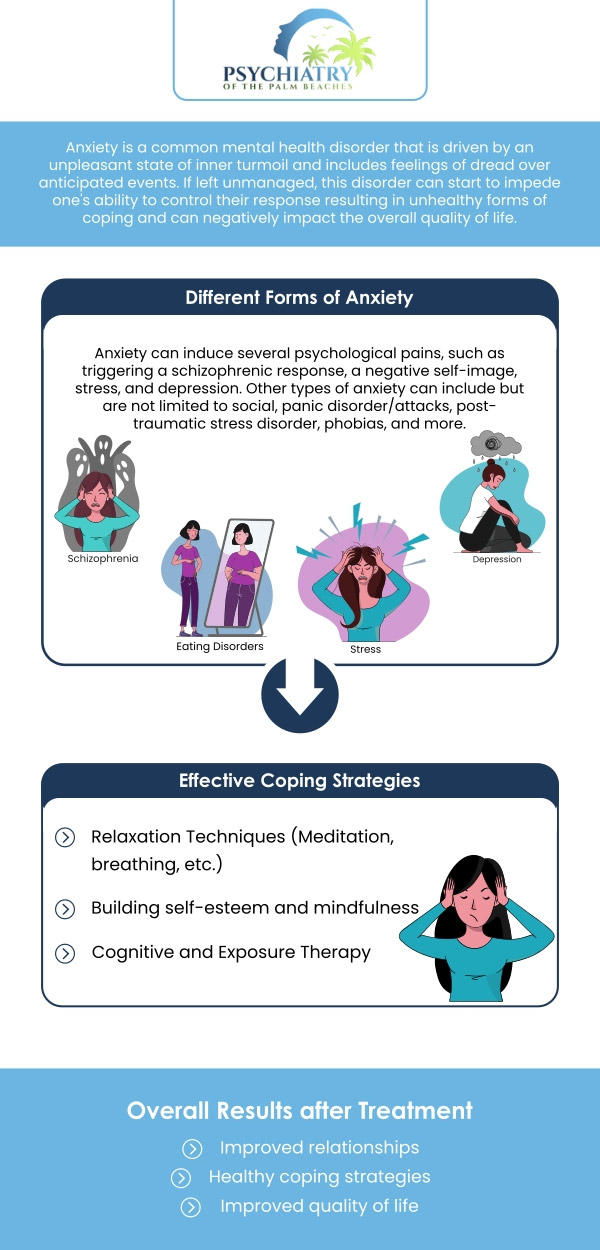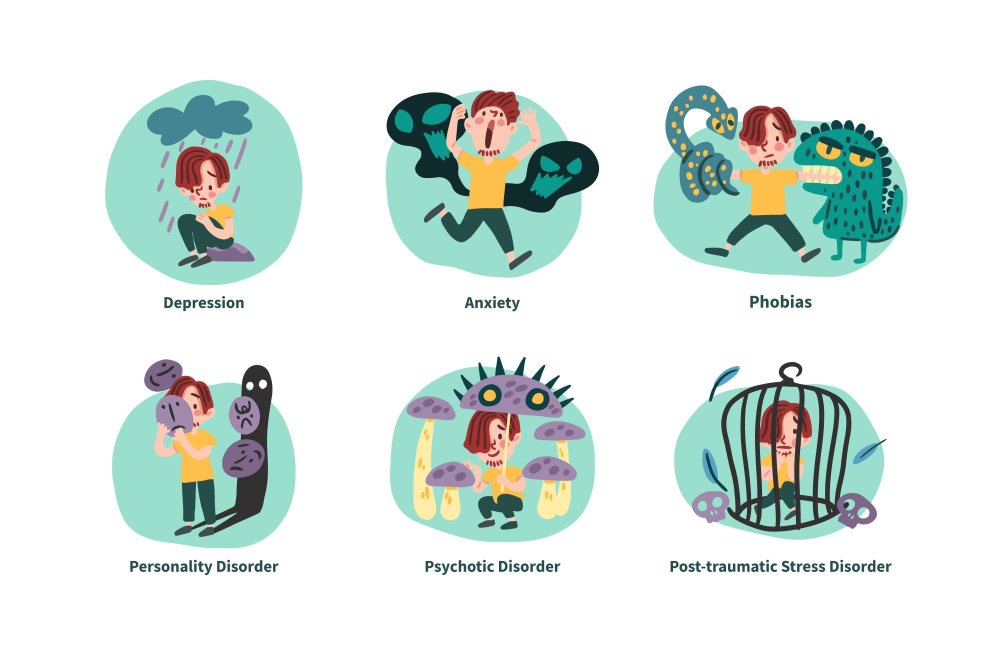Reliable Approaches in Therapy for Anxiety Problem: A Path to Recovery
When facing stress and anxiety problems, you might feel not sure and overwhelmed of where to transform. Reliable therapy approaches can pave the way for recovery, offering you with the devices to browse your challenges. From cognitive-behavioral strategies to mindfulness techniques, each approach provides one-of-a-kind advantages. Understanding just how these approaches collaborate can make a significant distinction in your trip. So, what are the vital elements that will assist you in the direction of lasting modification?

Understanding Anxiousness Conditions: A Thorough Summary
When you consider anxiousness problems, it's essential to recognize that they encompass a variety of conditions defined by extreme worry or fear. These problems can manifest in different methods, consisting of generalised anxiety problem, panic problem, and social anxiousness disorder. You may experience signs like fast heart beat, sweating, or difficulty focusing. It's common to feel overloaded, and these feelings can disrupt daily life.Understanding the origin of anxiousness is necessary. They can originate from genetics, mind chemistry, or ecological variables. You might find that specific scenarios trigger your anxiousness, making it important to recognize these triggers.
Cognitive Behavior Modification (CBT): Improving Thought Patterns
Cognitive Behavioral Treatment (CBT) provides powerful devices for reshaping the thought patterns that add to anxiety disorders. Through CBT, you'll learn to identify and test adverse thoughts that fuel your anxiousness. Rather than letting worry determine your activities, you'll deal with reframing those thoughts into even more positive, reasonable ones. This procedure assists you break the cycle of anxiousness by changing just how you view situations.You'll additionally establish coping strategies to take care of anxiety in real-time. By practicing direct exposure strategies, you'll progressively face your anxieties in a regulated fashion, reducing their power over you. Furthermore, you'll gain skills to problem-solve and browse difficult situations much more effectively.CBT is structured and goal-oriented, which suggests you'll see development as you use what you discover in therapy to your day-to-day life. With dedication and technique, you can significantly lower your stress and anxiety and enhance your overall wellness.
Mindfulness and Relaxation Techniques: Growing Present-Moment Recognition
Mindfulness and leisure strategies help you grow present-moment awareness, enabling you to take care of anxiety better. By concentrating on the present moment, you can break cost-free from the cycle of fear and rumination that frequently gas anxiousness. Begin by practicing deep breathing workouts. Inhale gradually with your nose, hold for a moment, then breathe out via your mouth. This easy method can soothe your mind and body.Engage in mindfulness reflection by setting aside a couple of minutes daily to observe your thoughts without judgment. Take notice of your breath, feelings, and the sounds around you. You could additionally find worth in progressive muscle mass leisure, where you stressful and unwind each muscular tissue team, promoting physical and psychological ease.Incorporating these techniques right into your day-to-day regimen can produce a better sense of control, decrease anxiousness symptoms, and improve your general health. Keep in mind, consistency is vital to experiencing the advantages.
Exposure Treatment: Facing Anxieties Slowly
Direct exposure therapy aids you face your fears slowly, permitting you to build self-confidence with time. By using progressive direct exposure techniques, you can slowly challenge what makes you nervous while developing efficient coping devices. This process not only decreases your anxiety yet likewise encourages you to take care of anxiety better.
Gradual Direct Exposure Techniques
You can properly reduce anxiousness and gain back control over your life when you face your concerns gradually. Steady direct exposure strategies include facing your worries detailed, starting with less intimidating scenarios (counselling for anxiety). You may begin by imagining the feared situation, after that advance to seeing videos or pictures related to it. At some point, you can practice facing the anxiety in the real world, but just when you really feel all set. This approach enables you to develop confidence as you move through each stage. Bear in mind to speed on your own; rushing can increase anxiety. Commemorate small victories along the way, as each progression encourages you. By continually using these methods, you'll find that your anxieties start to shed their hold on your mind
Building Coping Devices
Structure reliable coping systems is crucial for taking care of anxiety, especially as you encounter your anxieties progressively through direct exposure treatment. Beginning by recognizing your particular worries and damaging them down right into workable steps. By doing this, you can slowly face each anxiety without coming to be overloaded. If you have a hard time with social situations, begin by exercising tiny interactions, like welcoming a neighbor.Alongside gradual direct exposure, incorporate leisure strategies such as deep breathing or mindfulness to calm your mind before dealing with triggers. Maintain a journal to track your development and celebrate tiny success. Border yourself with encouraging pals or a therapist that can assist you. Bear in mind, it's a trip-- patience and determination will enhance your coping systems, bring about greater strength against anxiety.
Supportive Therapy: Structure Count On and Relationship
To effectively support someone with anxiety, developing count on and relationship is important from the really initial session. You'll wish to create a risk-free room where they really feel comfortable revealing their ideas and sensations without judgment. Active listening is key; show authentic passion in what they share. Recognize their feelings and verify their experiences. It is very important to be empathetic, as this assists develop a connection and encourages openness.Be constant in your approach and preserve privacy to additional strengthen that trust. Usage open body language and make eye contact to share your listening. Keep in mind, your persistence goes a long way; structure relationship takes some time, and it's crucial to respect their speed. By cultivating this encouraging setting, you'll equip them to engage more fully in the restorative process, making it less complicated for them to discover their stress and anxiety and pursue recovery.
Team Therapy: Shared Experiences and Collective Recovery
Team therapy can be an effective tool for those dealing with anxiety disorders, as it enables people to share their experiences and this discover solace in the understanding of others. In this supportive setting, you can share your feelings without fear of judgment. Listening to others' tales can stabilize your own experiences, making you feel less alone in your struggle.Participating in group therapy assists you establish dealing techniques through shared expertise and understandings. As you listen to others, you might discover new methods to tackle your stress and anxiety that you hadn't taken into consideration before.Moreover, the collective healing that takes place in these sessions can cultivate a sense of neighborhood, advising you that you're not encountering your obstacles alone.Building connections with others who understand your struggle can improve your self-confidence and inspiration to confront your stress and anxiety. Group treatment creates a room where growth and recovery come to be a common trip, equipping you to take actions toward recuperation.
Integrating Way Of Living Modifications: Holistic Methods to Stress And Anxiety Monitoring
While treatment gives crucial assistance, integrating way of life adjustments can significantly improve your capacity to manage anxiety. Begin by including routine physical activity right into your regimen. Workout launches endorphins, which can elevate your mood and minimize stress and anxiety. Next off, take note of your diet plan. Taking in a balanced diet abundant in fruits, veggies, and whole grains can favorably affect your psychological wellness. Don't ignore sleep-- purpose for 7-9 hours per evening, as quality remainder is important for psychological regulation.Mindfulness techniques, such as reflection or yoga, can also assist you remain grounded and present. Think about establishing apart time each day to exercise these strategies. Limitation caffeine and alcohol consumption, as they can exacerbate anxiety symptoms. By making these holistic adjustments, you develop a more powerful structure for taking care of stress and anxiety, complementing the benefits gained from therapy. counselling for anxiety. Remember, every little step counts on your path to recovery

Often Asked Inquiries
What Are the Usual Physical Symptoms of Stress And Anxiety Problems?
Typical physical symptoms of stress and anxiety conditions include quick heart rate, shortness of breath, muscle mass stress, sweating, and frustrations. You could likewise experience fatigue, wooziness, or stomach issues, which can even more complicate your life.
The Length Of Time Does Counseling for Anxiety Typically Take?
Counseling for anxiety commonly takes a couple of weeks to a number of months, depending on your specific needs and progression (counselling for anxiety). You'll discover that regular sessions aid you create dealing strategies and obtain insights right into your anxiety

Can Anxiety Conditions Be Totally Treated?
While anxiousness conditions can not constantly be completely healed, you can manage your signs properly. With the best approaches and support, you'll find ways to minimize anxiousness, boost your well-being, and lead a fulfilling life.
What Should I Perform in an Anxiety attack?
During an anxiety attack, concentrate on your breathing. Inhale deeply via your nose, hold for a moment, then breathe out slowly. Ground on your own by calling items around you, and remind on your own it will certainly pass.
Are There Medications for Anxiety Problems?
Yes, there are several medicines for stress and anxiety conditions, including antidepressants and benzodiazepines. You should consult a health care expert to locate the appropriate therapy strategy tailored to your particular demands and situations for the very best results. When you assume about anxiousness problems, it's crucial to acknowledge that they incorporate a range of conditions identified by extreme fear or fear. These problems can show up in different means, consisting of generalised anxiousness condition, panic condition, and social anxiety condition. Structure effective coping systems is important for handling anxiousness, particularly as you face your worries slowly with exposure treatment. Team treatment can be an effective device for those dealing with anxiety conditions, as it permits people to share their experiences and locate relief in the understanding of others. As you listen to others, you may discover brand-new ways to tackle your anxiety that you had not thought about before.Moreover, the cumulative recovery that happens in these sessions can promote a sense of neighborhood, reminding you that you're not encountering your obstacles alone.Building connections with others that recognize your battle can enhance your confidence and motivation to challenge your stress and anxiety.